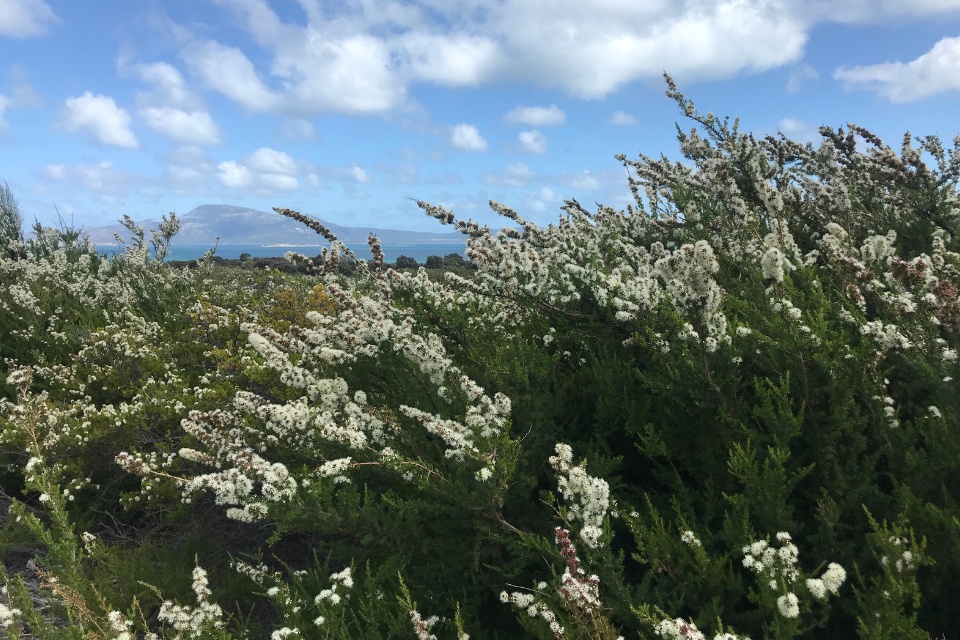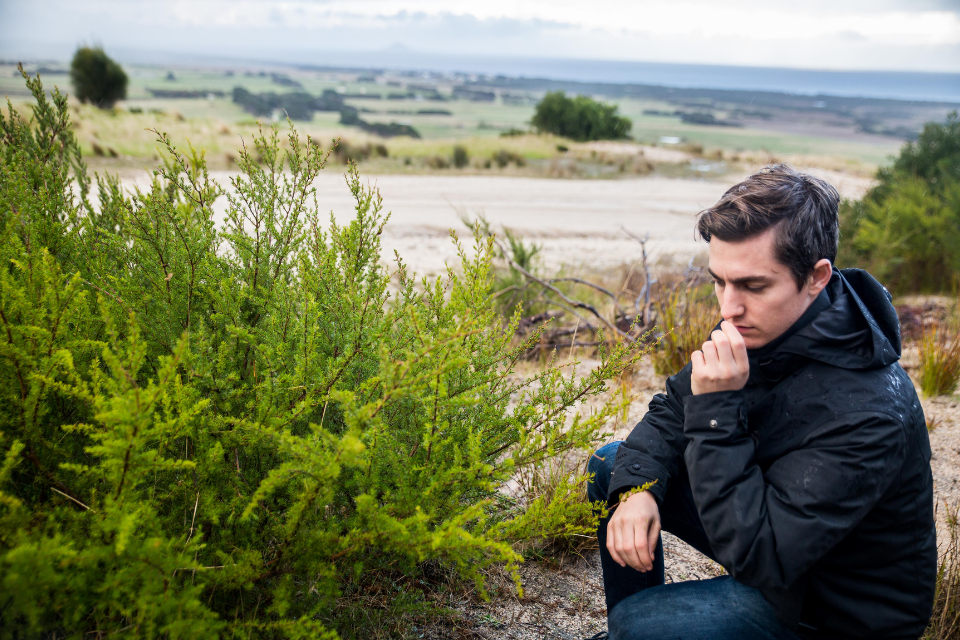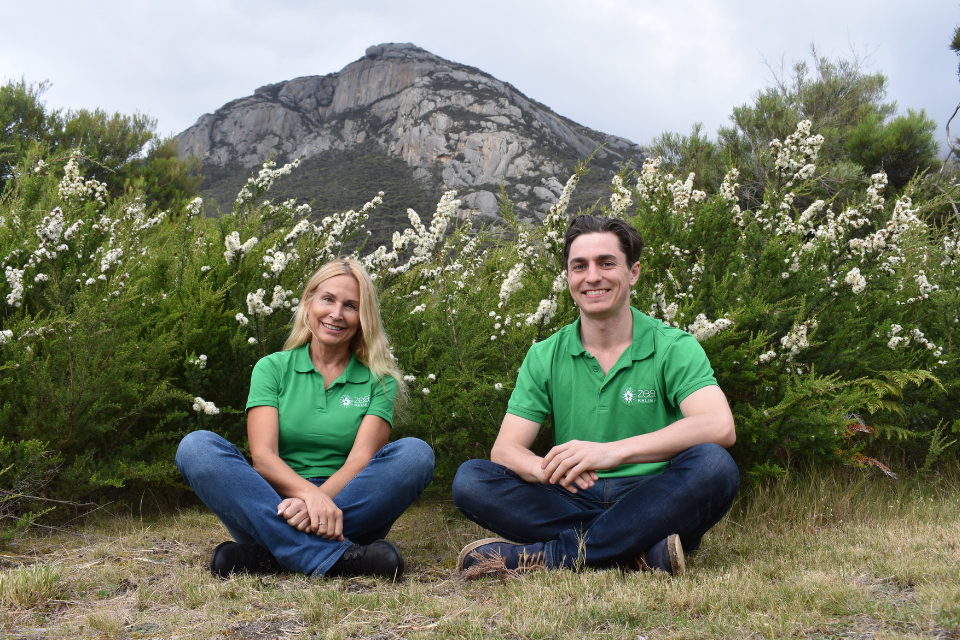The Zea Team recently spent three beautiful days on Flinders Island, exploring its untouched natural environment and learning about its growing essential oil industry. Located in the Bass Strait, northeast of Tasmania, Flinders Island is the largest in the Furneaux Group.
Famous for its untouched beaches, crystal clear waters and some of the finest produce in the world, Flinders Island is where time stops still. People wave at you when you pass them on the road, and you can immerse yourself in unique Australian wildlife and trek through natural wonders.
Flinders Island Essential Oils
Pristine beaches surround Flinders Island and the plant on which we base our signature range of Kunzea Pain Relief Products grows abundantly; Australian Kunzea ambigua.
We visited during the flowering season, so the Kunzea plant was covered in small creamy-white, honey-scented flowers. This explains how it got the nickname "White Cloud".
There is nothing more amazing and inspiring than to walk, touch and breathe in the beautiful essence of the native bush. You can walk for miles along deserted beaches and have this gorgeous plant lining the coastline in abundant beauty.
Kunzea ambigua is also commonly known as Tick Bush, so it was wonderful to see firsthand the native animals hide under the plant to escape ticks and other parasitic infestation. We also know that Kunzea shares many attributes and healing properties to that of Tea Tree and Eucalyptus, and its fresh, uplifting aroma is invigorating.
Our visit to Flinders Island also introduced us to various other native plant oils that are endemic to the island, such as Southern Rosalina (Melaleuca ericifolia), Coastal Tea Tree (Leptospermum laevigatum) and Flinders Island Blue Gum (Eucalyptus globulus).
We will be using these native Tasmanian essential oils to formulate exciting new blends and Kunzea Products in the near future.

Wombats "Mange" Disease
One troubling aspect of Flinders Island, that we did learn of during our visit was the skin infection known as mange that has been affecting many of the wombats in Tasmania for hundreds of years. It is caused by a burrowing parasitic mite called Sarcoptes scabiei, that is believed to have been introduced to Australia by European settlers and their domestic animals, with subsequent spill-over events to the native wildlife. Of the native Australian mammal species known to be affected by mange, wombats appear to be most impacted.
According to DPIPWE Tasmania, "Mange infection in an animal can result in aggressive scratching, hair loss, skin thickening and crusting, skin discolouration, open wounds (from scratching), weight loss, and in severe cases, death (as a result of secondary infection and suppressed immune system)".
We did witness a couple of these poor creatures during our stay on the Island. We hope to do some fundraising in the future to help find a cure for this skin infection that is affecting our much-loved native marsupial. Kunzea may even offer a solution one day to help this condition.
A Rugged & Remote Island Oasis
Flinders Island is a rare find in this busy man-made world in which we are now accustomed to in today's society. Off Tasmania’s north-east coast, this strikingly beautiful remote isle is inhabited by a close-knit community and an abundance of native flora and fauna. The island is self-sustainable, using primarily renewable energy sources, and the air is some of the cleanest in the world.
With a population of fewer than 900 people, it is one of those places where you can basically find your own little private beach and not have anyone even close to sharing it with you. Reputed to have zero crime and zero unemployment, means you can leave your key in the ignition of your car and your doors always unlocked.
This sense of security and connection to mother nature, coupled with the Flinders Island Wave**, are additional reasons why we are proud to source Kunzea and other native ingredients from such a pristine, untouched natural environment.
**Also, if you don't know the Flinders Island Wave, this video will enlighten you:
Essential Oil Production
Whilst visiting Flinders Island we were fortunate enough to see the full essential oil production process in action. At present, all the local essential oils on Flinders Island are sustainably wild-harvested from the native plants that grow abundantly throughout the island. The producers are currently in the early stages of developing the Island's first Kunzea plantation.

A day of harvesting starts very early in the morning, so we woke up at the crack of dawn, dressed in our winter woollies and drove to the site where the harvesting of Melaleuca ericifolia was taking place.
The clouds darkened shortly after we arrived at the harvesting area, however, thankfully we were able to see the harvest in progress before it started to rain.
The freshly harvested plant matter was then transported back to the distillery, where it was promptly steam distilled. As the pure oil was being extracted from the dry plant matter, the fresh, natural scent filled the production facility.
Seeing the pure oil in it's raw and organic state, makes us very proud to be using such incredible ingredients. Our natural products give us the opportunity to share a part of Flinders Island's unsurpassed freshness and purity with the world.
We look forward to launching new products based on other natural ingredients from this unique, untouched island oasis.




